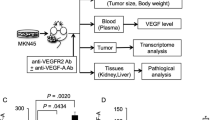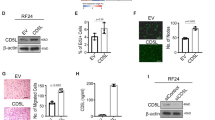Abstract
Increased expression of VEGF in several types of tumours has been shown to correlate with poor prognosis. We used a replication-deficient adenoviral vector containing antisense VEGF cDNA (Ad5CMV-αVEGF) to down-regulate VEGF expression and increase the efficiency of delivery of the antisense sequence in the human breast cancer cell line MDA231-MB. Transfection of these cells with Ad5CMV-αVEGF in vitro reduced secreted levels of VEGF protein without affecting cell growth. Moreover, injection of the Ad5CMV-αVEGF vector into intramammary xenografts of these cells established in nude mice inhibited tumour growth and reduced the amount of VEGF protein and the density of microvessels in those tumours relative to tumours treated with the control vector Ad5(dl312). Our results showed that antisense VEGF165cDNA was efficiently delivered in vivo via an adenoviral vector and that this treatment significantly inhibited the growth of established experimental breast tumours. The Ad5CMV-αVEGF vector may be useful in targeting the tumour vasculature in the treatment of breast cancer. © 2001 Cancer Research Campaign http://www.bjcancer.com
Similar content being viewed by others
Article PDF
Change history
16 November 2011
This paper was modified 12 months after initial publication to switch to Creative Commons licence terms, as noted at publication
References
Asano M, Yukita A, Matsumoto T, Kondo S and Suzuki H (1995) Inhibition of tumor growth and metastasis by an immunoneutralizing monoclonal antibody to human vascular endothelial growth factor/vascular permeability factor 121. Cancer Res 55: 5296–5301
Attia MA and Weiss DW (1966) Immunology of spontaneous mammary carcinomas in mice. V: acquired tumor resistance and enhancement in strain of mice infected with mammary tumor virus. Cancer Res 26: 1787–1800
Boehm T, Folkman J, Browder T and O'Reilly MS (1996) Antiangiogeneic therapy of experimental cancer does not induce acquired drug resistance. Nature 390: 404–407
Blood CH and Zetter BR (1990) Tumor interactions with the vasculature: angiogenesis and tumor metastasis. Biochem Biophys Acta 1032: 89–118
Cheng S, Su Huang H, Nagane M, Ji X, Wang D, Shih CC, Arap W, Huang C and Cavenee WK (1996) Suppression of glioblastoma angiogenicity and tumorigenicity by inhibition of endogeneous expression of vascular endothelial growth factor. Proc Natl Acad Sci USA 93: 8502–8507
Dvorak HF, Detmar M, Claffey KP, Nagy JA, Van De Water L and Senger DR (1995) Vascular permeability factor/vascular endothelial growth factor: an important mediator of angiogenesis in malignancy and inflammation. Int Arch Allergy Appl Immunol 107: 233–235
Folkman J (1994) Angiogenesis and breast cancer. J Clin Oncol 12: 441–443
Gomez-Manzano C, Fueyo J, Kyritsis AP, Steck PA, Roth JA, McDonnell TJ, Steck KD, Levin VA and Yung WKA (1996) Adenovirus- mediated transfer of the p53 gene produces rapid and generalized death of human glioma cells via apoptosis. Cancer Res 56: 694–699
Graham FL and Prevec L (1991) Manipulation of adenovirus vectors. Murray EJ (ed). Gene Transfer and Expression Protocols, 109–128, Human Press, Inc: Clifton NJ
Im SA, Lee SN and Kim SS (1997) Tumor angiogenesis as a predictor of prognosis in gastric carcinoma. J Korean Cancer Assoc 29: 640–647
Im SA, Gomez-Manzano C, Fueyo J, Liu TJ, Ke LD, Kim JS, Lee HY, Steck PA, Kyritsis AP and Yung WKA (1999) Antiangiogenesis treatment for gliomas: transfer of antisense-vascular endothelial growth factor inhibits tumor growth in vivo. Cancer Res 59: 895–900
Jones N and Shenk T (1979) An adenovirus type 5 early gene function regulates expression of other early viral genes. Proc Natl Acad Sci USA 76: 3665–3669
Ke LD, Fueyo J, Chen X, Steck PA, Shi YX, Im SA and Yung WKA (1998) A novel approach to glioma gene therapy: down-regulation of the vascular endothelial growth factor in glioma cells using ribozymes. Int J Oncol 12: 1391–1396
Kim KJ, Li B, Winer J, Armanini M, Gillett N, Phillips HS and Ferrara N (1993) Inhibition of vascular endothelial growth factor-induced angiogenesis suppresses tumor growth in vivo. Nature 362: 841–844
Saleh M, Stacker SA and Wilks AF (1996) Inhibition of growth of C6 glioma cells in vivo by expression of antisense vascular endothelial growth factor sequence. Cancer Res 56: 393–340
Shibuya M (1995) Role of VEGF-Flt receptor system in normal and tumor angiogenesis. Adv Cancer Res 67: 281–316
Takahashi Y, Kitadai Y, Bucana CD, Cleary KR and Ellis LM (1995) Expression of vascular endothelial growth factor and its receptor, KDR, correlates with vascularity, metastasis, and proliferation of human colon cancer. Cancer Res 55: 3964–3968
Tanaka T, Cao Y, Folkman J and Fine HA (1998) Viral vector- targeted antigangiogenic gene therapy utilizing an angiostatin complementary DNA. Cancer Res 58: 3362–3369
Toi M, Inada K, Suzuki H and Tominaga T (1995) Tumor angiogenesis in breast cancer: its importance as a prognostic indicator and the association with vascular endothelial growth factor expression. Breast Cancer Res Treat 36: 193–204
Weidner N, Folkman J, Pozza F, Bevilacqua P, Allred EN, Moore DH, Meli S and Gasparini G (1992) Tumor angiogenesis: a new significant and independent prognostic indicator in early stage breast carcinoma. J Natl Cancer Inst 84: 1875–1887
Yoshiji H, Gomez DE, Shibuya M and Thorgeirsson UP (1996) Expression of vascular endothelial growth factor, its receptor, and other angiogenic factor in human breast cancer. Cancer Res 56: 2013–2016
Yoshiji H, Harris SR and Thorgeirsson UP (1997) Vascular endothelial growth factor is essential for initial but not continued in vivo growth of human breast carcinoma cells. Cancer Res 57: 3924–3928
Zhang WW, Fang X, Branch CD, Mazur W, French BA and Roth JA (1993) Generation and identification of recombinant adenovirus by liposome-mediated transfection and PCR analysis. Biotechniques 15: 868–872
Author information
Authors and Affiliations
Rights and permissions
From twelve months after its original publication, this work is licensed under the Creative Commons Attribution-NonCommercial-Share Alike 3.0 Unported License. To view a copy of this license, visit http://creativecommons.org/licenses/by-nc-sa/3.0/
About this article
Cite this article
Im, SA., Kim, JS., Gomez-Manzano, C. et al. Inhibition of breast cancer growth in vivo by antiangiogenesis gene therapy with adenovirus-mediated antisense-VEGF. Br J Cancer 84, 1252–1257 (2001). https://doi.org/10.1054/bjoc.2000.1734
Received:
Revised:
Accepted:
Published:
Issue date:
DOI: https://doi.org/10.1054/bjoc.2000.1734
Keywords
This article is cited by
-
Breast tumour angiogenesis
Breast Cancer Research (2007)
-
Generating MHC Class II+/Ii- phenotype after adenoviral delivery of both an expressible gene for MHC Class II inducer and an antisense Ii-RNA construct in tumor cells
Gene Therapy (2003)
-
Experimental study on the gene therapy of malignant glioma with antisense VEGF RNA
Chinese Journal of Cancer Research (2003)



